People
The research committee of Modern Money Lab consists of people drawn from academia and the financial sector, with recent and relevant experience of public policy. We draw on the advice of external consultants, who are economists with recent and senior public policy experience or senior roles within relevant research organisations.
Research Committee

A/ Professor Steven Hail
TORRENS UNIVERSITY AUSTRALIA
Steven Hail is an Associate Professor at Torrens University, having previously been a Lecturer in the School of Economics at the University of Adelaide. He has also been a Lecturer in the School of Business Economics at Flinders University, and a Visiting Lecturer at the International Graduate School of Management at the University of South Australia. He also has extensive experience of training banking and financial service professionals in the United Kingdom, including staff from the Bank of England.
Dr Hail is one of Australia’s leading modern monetary theory economists, and has given seminars on modern money at the Department of Prime Minister and Cabinet in Canberra, for the Economics Society of Australia, and for ANZ Bank, among many others.
He regularly appears in the media, including contributions to The Conversation and in newspapers, and published the 2018 book Economics for Sustainable Prosperity. He is a 2016 recipient of the Vice Chancellor’s Medal for Doctoral Thesis Excellence at Flinders University.
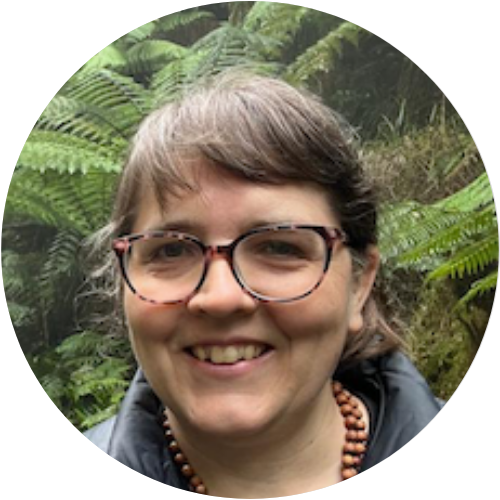
Dr Anthelia Bond
MODERN MONEY LAB
Anthelia (Annie) Bond is Research Director (Ecological Economics) at Modern Money Lab and an Adjunct Lecturer at Torrens University. Annie has a PhD in ecological economics and her cross disciplinary publication record includes articles in the Journal of Applied Ecology, Land Use Policy and Environmental Management.
Annie’s wide experience in research and environmental policy includes roles at the Commonwealth Scientific and Industrial Research Organisation (CSIRO), The University of Adelaide, government agencies and non-government organisations. Annie is a board member of the Nature Conservation Society of South Australia and member of Scientist Rebellion.

Con Michalakis
Deputy Chief Investment Officer, HostPlus Superannuation
Con Michalakis is the Deputy Chief Investment Officer of one of the largest superannuation funds in Australia, and a prominent and widely respected figure in the fund management sector and beyond.
Mr Michalakis was previously the Director, Head of Institutional Business, for Merrill Lynch Investment Managers, based in Sydney. Con has also worked in London and New York, and has very extensive relevant experience and international contacts.
He has a Bachelor of Mathematical Science degree from the University of Adelaide, a Masters of Science degree from the University of London and a Postgraduate Diploma in Financial Strategy from Saïd Business School at the University of Oxford.
Adjunct Professors and Patron

Professor Stephanie Kelton
Professor of Economics and Public Policy, Stony Brook University, USA
Stephanie Kelton is a Professor of Economics and Public Policy at Stony Brook University. She is a leading expert on Modern Monetary Theory and a former Chief Economist on the U.S. Senate Budget Committee (Democratic staff). She was named by POLITICO as one of the 50 people most influencing the policy debate in America, and by Bloomberg as one of the 50 people who most defined 2019. She has just been nominated by Barro’s as one of the most influential women in finance in 2021.
Professor Kelton advises policymakers and consults with investment banks and portfolio managers across the globe. She is a regular commentator on national radio and broadcast television, and contributor to the New York Times and other publications. Her highly influential book, The Deficit Myth, became an instant New York Times bestseller, and was the top-selling economics and public policy book in the world across 2020. She has also written seminal peer-reviewed research papers and is a frequent contributor to the work of the widely respected Levy Economics Institute.
She was the 2020 Visiting Harcourt Professor at the University of Adelaide, and during a two-week stay in Australia, was interviewed by almost all leading news media, including television.
Stephanie publishes regular articles via her Substack The Lens, featuring economic analysis, research and commentary using an MMT lens.
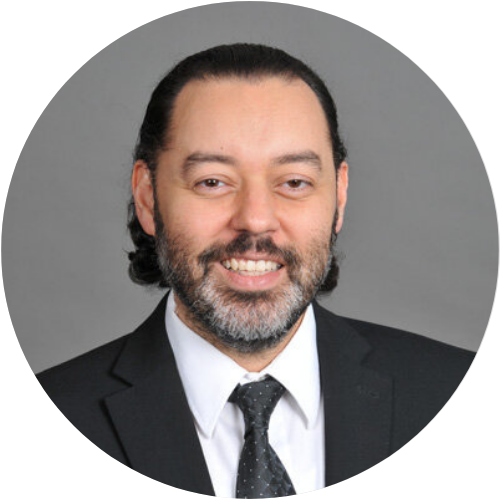
Professor Fadhel Kaboub
President of the Global Institute for Sustainable Prosperity and Associate Professor of Economics, Denison University, USA
Fadhel Kaboub is an associate professor of economics at Denison University (on leave), and the president of the Global Institute for Sustainable Prosperity. He is also a member of the Independent Expert Group on Just Transition and Development, and serves as senior advisor with Power Shift Africa.
He has recently served as Under-Secretary-General for Financing for Development at the Organisation of Southern Cooperation in Addis Ababa, Ethiopia. Dr. Kaboub is an expert on designing public policies to enhance monetary and economic sovereignty in the Global South, build resilience, and promote equitable and sustainable prosperity.
His recent work focuses on Just Transition, Climate Finance, and transforming the global trade, finance, and investment architecture. His most recent co-authored publication is Just Transition: A Climate, Energy, and Development Vision for Africa (May 2023, published by the Independent Expert Group on Just Transition and Development). He has held a number of research affiliations with the Levy Economics Institute (NY), the John F. Kennedy School of Government at Harvard University (MA), the Economic Research Forum (Cairo), Power Shift Africa (Nairobi), and the Center for Strategic Studies on the Maghreb (Tunis).
He is currently based in Nairobi, Kenya and is working on climate finance and development policies in Africa. You can follow him on Twitter @FadhelKaboub and you can read his Global South Perspectives on substack where he blogs regularly.

Warren Mosler
MOSLER ECONOMICS
Warren Mosler is an American economist and theorist, and one of the leading voices in the field of Modern Monetary Theory (MMT). Presently, Warren resides on St. Croix, in the US Virgin Islands, where he owns and operates Valance Co., Inc.
An entrepreneur and financial professional, Warren Mosler has spent the past 40 years gaining an insider’s knowledge of monetary operations. He co-founded AVM, a broker/dealer providing advanced financial services to large institutional accounts and the Illinois Income Investors (III) family of investment funds in 1982, which he turned over to his partners at the end of 1997. He began his career after graduating from the University of Connecticut with a B.A. in Economics in 1971 and has been deeply involved in the academic community, giving presentations at conferences around the world and publishing numerous articles in economic journals, newspapers, and periodicals.
He is attributed with creating Mosler’s law that states, “there is no financial crisis so deep that a sufficiently large fiscal adjustment cannot deal with it.”
Mosler is the author of “The Seven Deadly Innocent Frauds of Economic Policy” that has been translated into Italian, Polish, Russian, Arabic, and Spanish.
Adjunct Lecturers, Modern Money Lab

Associate Professor Scott Fullwiler
University of Missouri - Kansas City
Scott Fullwiler is Associate Professor at UMKC and a Research Scholar at the Global Institute for Sustainable Prosperity. He is very widely published and has written or co-authored some of the most important papers ever written in modern monetary theory.
Scott was previously an assistant professor of economics and James A. Leach chair in banking and monetary economics at Wartburg College, Waverly, Iowa, where he taught finance, banking, and macroeconomics. He has also been a research associate at the Center for Full Employment and Price Stability, University of Missouri–Kansas City. His research interests include financial markets, monetary operations, and macroeconomic policy, focussing on simulation with large macroeconometric models and the sustainability of alternative macroeconomic policy regimes.
His research has been published in Journal of Economic Issues, Journal of Post Keynesian Economics, and in edited volumes. Fullwiler studied at Washington State University and Universität Bonn (Germany) prior to earning B.A. (1994) and Ph.D. (2001) degrees in economics from the University of Nebraska. His dissertation on the federal funds market was written under the direction of Veblen-Commons Award recipient, F. Gregory Hayden.
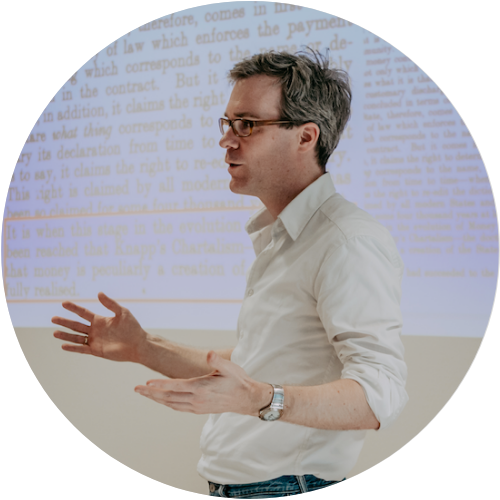
Dr Dirk Ehnts
STEINBEIS SCHOOL OF MANAGEMENT AND INNOVATION, GERMANY
Dr Dirk Ehnts is an adjunct lecturer of Economics at Steinbeis School of Management and Innovation. He is a leading expert on Modern Monetary Theory in the Eurozone and has worked in academic positions at the Berlin School of Economics, Free University Berlin, Technical University of Chemnitz, European University of Flensburg and Bard College Berlin.
Dr Ehnts has advised the financial experts committee of the German and Irish national parliament. He writes a column titled “TransformNation” at Makroskop (in Germany) and regularly publishes academic and policy articles on MMT, macroeconomics, history of economic thought and the European economy. His books include “Geld und Kredit: Eine €-päische Perspektive (2014), “Modern Monetary Theory and European Macroeconomics” (2016), “Modern Monetary Theory: Eine Einführung” (2022). He has taught courses on MMT at Maastricht Summer School since 2016 and has been invited to teach at the summer school of the Levy Economics Institute. He is book review editor at the International Journal of Pluralism and Economics Education (IJPEE).

Colleen Schneider
Vienna University of Economics and Business
Colleen Schneider is a PhD student and research assistant in the Institute for Ecological Economics at the Vienna University of Economics and Business. She has a BA in Physics from UC Berkeley and MSc in Socio-Ecological Economics and Policy from WU.
Her research focuses on the political economy of monetary and fiscal policy in a social-ecological transformation. Her current work focuses on the distributional consequences of the European Central Bank’s policy responses to the COVID pandemic. She teaches courses in social ecological economics, and the intersection of money, society and environment. Colleen co-authored a chapter focusing on money and finance in the book ‘Strategies for Degrowth’, and has also worked and published in the field of environmental justice.

Professor John T Harvey
TEXAS CHRISTIAN UNIVERSITY
John T. Harvey earned his Ph.D. in Economics from the University of Tennessee and has been at Texas Christian University ever since. He specializes in international economics (particularly exchange rates), macroeconomics, business cycles, and contemporary schools of thought. Dr. Harvey has over forty refereed publications, plus two edited volumes, two books, and a number of teaching and research awards.
His first volume was Currencies, Capital Flows and Crises (2009, Routledge Publishing), and his second volume was Contending Perspectives in Economics (second edition 2020, Edward Elgar Publishing).
Dr. Harvey has twice served as chair of the TCU Department of Economics, as well as Executive Director of the International Confederation of Associations for Pluralism in Economics, lead editor of the World Economic Review, member of the board of directors of the Association for Evolutionary Economics, and member of the editorial boards of the American Economist, American Review of Political Economy, the Critique of Political Economy, the Encyclopedia of Political Economy, the Journal of Economics Issues, and the Social Science Journal.
Dr. Harvey is a frequent speaker for local civic organizations and has been interviewed on dozens of podcasts based around the world. He also has a blog at Forbes.com entitled Pragmatic Economics and a YouTube station called “The Cowboy Economist.”

David Joy
Modern Money Lab
David Joy has lectured at the University of Adelaide and been an academic head at Kaplan Business School. He worked in banking and finance before switching his focus to teaching at a tertiary level. David is also a chartered accountant.

Dr Erik Dean
PORTLAND COMMUNITY COLLEGE
Erik Dean is an economics instructor at Portland Community College, USA; a research scholar with the Global Institute for Sustainable Prosperity; and Treasurer of the Association for Institutional Thought. He received his PhD from the University of Missouri-Kansas City in 2013 and has since published papers in the Journal of Economic Issues, the Review of Keynesian Economics, and the Review of Social Economy.
Dr. Dean’s research has focused on the institutional evolution of the business enterprise, financialization, and the proliferation of bullshit jobs, so called. He is also a co-author of the Creative Commons-licensed textbook Principles of Economics: Scarcity and Social Provisioning.

Rigo Melgar
Gund Institute for Environment
Rigo is a PhD candidate and fellow of the Leadership for the Ecozoic (L4E) project at the Rubenstein School of Environment and Natural Resources, and the Gund Institute for Environment at the University of Vermont (UVM).
He is interested in rethinking economics for the 21st century to inform systems change to achieve well-being within planetary boundaries for all.
Rigo’s research is grounded in heterodox economics, with specialisation in ecological economics rooted in systems thinking and its biophysical and social foundations. He is also the founder of Ecological Economics for All, an open-access educational initiative.
Modern Money Lab Committee

Dr Elaine Stead
Director, Cicada Innovations
Elaine Stead is a venture capital investor based in Adelaide. Her investment track record extends to over 80 startups across Australia, the United States and South East Asia.
Elaine has been a scientist, turned entrepreneur, turned venture capitalist, and never quite shed any of these roles.
Across over two decades in the innovation sector, Elaine has been a serial entrepreneur, founding medtech company Reproductive Health Science and Blue Sky VC a subsidiary of Blue Sky Alternative Investments, Human VC and Artefact ventures. She is one of the longest serving still active venture capitalists in Australia, having been involved in the management of over $450m across five venture fund vintages, four within her own fund manager, Blue Sky VC.
She’s a director of Cicada Innovations, an advisor to the federal governments Entrepreneurs Program, the architect of the new ventures and entrepreneurship strategy for the ANU, a member of the investment committee member for the ANUCV venture capital fund, and also a regular conference speaker and contributor to publications such as Sydney Morning Herald, Women’s Agenda, InnovationAus and SmartCompany.
Elaine’s profile amongst the innovation ecosystem, in the Australian tech industry and the broader business community, guarantees a high level of trust amongst all stakeholders, unparalleled deal flow, outstanding global networks and experience in supporting the human leadership of portfolio companies.
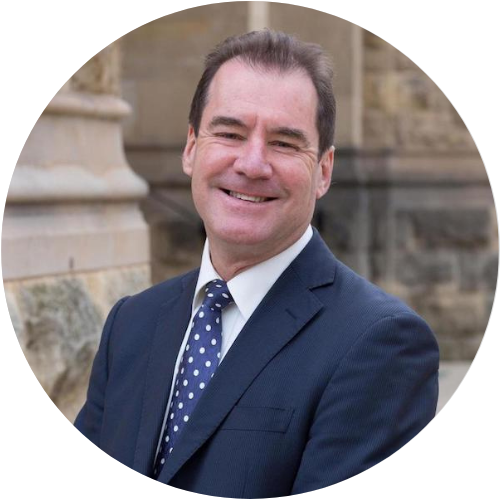
Damian Scanlon
Principal, DAS Business Advisory
Damian has had more than 15 years senior executive experience, working for major Australian publicly listed companies, mainly in the aviation and mineral processing industries, with short stints in the banking and oil industries and the Commonwealth Government early in his career. Positions he has held include senior executive management, including CEO and board positions, requiring extensive travel throughout Australia, Europe, North America and Asia. His roles have seen him based in Canberra, Sydney, Melbourne and Adelaide.
Since leaving the corporate environment in late 1998, Damian successfully pursued a number of entrepreneurial opportunities in the aquaculture, software and property industries, both as a shareholder and Executive Director. In January 2009, Damian was appointed COO and CFO of the Royal Institution of Australia Inc. and effectively established the organisation from the ‘ground up’, taking it from 2 to 22 employees and fully implementing its vision. In January 2012, Damian was appointed MBA Director at the University of Adelaide. During his tenure, the Graduate Management Association of Australia rankings moved from 4 Stars to 5 Stars (top tier) and the Australian Financial Review BOSS rankings climbed from #10 to #2 in Australia. Damian has since left the University and currently provides consulting and business advisory work to a range of clients and currently chairs the Adelaide Education Group.
In his own time, Damian supports several not-for-profit organisations in a voluntary role as well as working on a number of start-ups, one of which is a major project declared by the Minister for Planning in the southeast of SA. He also is Treasurer of the SA Museum Foundation and Chairman of the SA Museum Foundation Investment Committee. Damian holds a Bachelor of Economics (Flinders University of SA) and a Master of Business Administration (University of Adelaide).
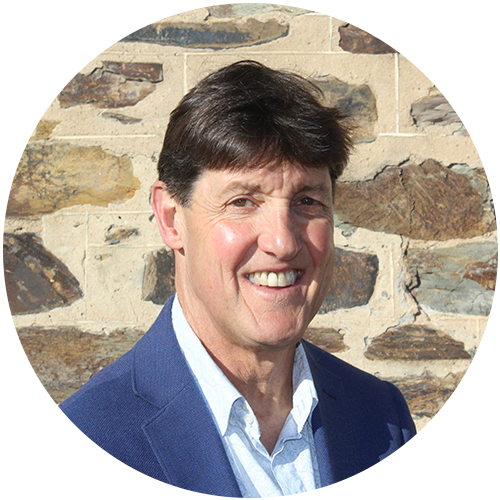
Professor Philip Lawn
TORRENS UNIVERSITY AUSTRALIA
Philip Lawn was recently made an Adjunct Professor at Torrens University Australia. He is a former Associate Professor in the Business School at Flinders University, and currently a Visiting Lecturer at the University of Adelaide. He is also a Research Scholar at the Global Institute for Sustainable Prosperity and a member of the Wakefield Futures Group of Concerned Scientists.
Dr Lawn founded The International Journal of Environment, Workplace, and Employment in 2004 and served as the founding editor of the journal until 2009. He is one of the main developers and promoters of the Genuine Progress Indicator (GPI) as an indicator of social well-being, and one of Australia’s leading ecological economists. He has undertaken commissioned work for the governments of South Australia, Queensland and Victoria.
He has published many peer-reviewed research papers, including in A* rated academic journals, and written or edited several important books relating to the principles and policy aspects of sustainable development – most notably his 2016 book, Resolving the Climate Change Crisis: The Ecological Economics of Climate Change.
